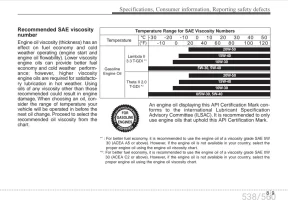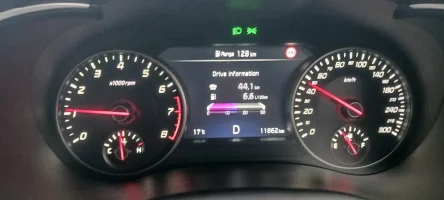The oil I linked specifically states it is API SP rated and notes word for word in the description that it prevents lspi. This isn't the prior linked 8100 xcess.I used it without any issues. Oil analysis was ok. It's high in calcium which can increase the likelihood of low-speed pre-ignition. A better choice imo would be an oil that is API SP rated for added insurance.
Right now I'm using amsoil 10w40 in the summer months. I'll go back to a 5w in the colder months
You are using an out of date browser. It may not display this or other websites correctly.
You should upgrade or use an alternative browser.
You should upgrade or use an alternative browser.
anyone using 5w40 instead of 5w30 on tuned cars ?
- Thread starter byebyeSTI
- Start date
HoosierStinger
Active Member
Yes I replied to the wrong message sorry about that. My thoughts on oil weight. Thicker is better especially if you're tuned. The turbos are going to heat up the oil more which will thin it out.The oil I linked specifically states it is API SP rated and notes word for word in the description that it prevents lspi. This isn't the prior linked 8100 xcess.
This is from the 2018 Stinger owners manual

From what I understand the only reason all manufacturers are moving to a thinner oil is to increase fuel economy. Emissions blah blah blah
The 0w5 water toyota uses terrifies me as an old lube tech.Yes I replied to the wrong message sorry about that. My thoughts on oil weight. Thicker is better especially if you're tuned. The turbos are going to heat up the oil more which will thin it out.
This is from the 2018 Stinger owners manual
View attachment 86958
From what I understand the only reason all manufacturers are moving to a thinner oil is to increase fuel economy. Emissions blah blah blah
I have a jb4 with supporting bolt on mods and the air temp where I live is commonly 100/110+ in the summer. That's my motivation for the slightly thicker oil. I also monitor my oil temps in dash and I try not to shut the car off until the temp is under 200.
I bought the bms trans cooler as a reliability mod, what are your thoughts on motuls atf, if any? It states it's for cars that require dexron/mercon except dexron VI.
______________________________
Buzzman12
Active Member
This is scary, as you said. Given that pretty much all modern cars with direct injection have gas in oil issues to some degree, the 0W5 will get even thinner over time.The 0w5 water toyota uses terrifies me as an old lube tech.
As a quick aside, my previous car was a Mazda (2017 Mazda 6) and it recommended 0W20 in the manual.
Oddly enough, this was only in North American cars. Every other country in the world, the manual recommended 5W30. The 0w20 oil was all about meeting US CAFE standards, nothing more. The Mazda engine is the same worldwide btw.
I switched my Mazda to 5W30 early on, and it ran quieter and happier.
The 0w5 water toyota uses terrifies me as an old lube tech.
Pretty sure the thinnest factory oil in use is that 0w16 stuff that has its own special designations to make it clear it's only for ultra light duty hybrids trying to squeeze out every last mpg. The 0w5 I've seen was race oil (redline?), basically for 1/4 mile cars that never run long enough to heat the oil enough to thin it out and want every last horsepower that lower viscosity frees up.This is scary, as you said. Given that pretty much all modern cars with direct injection have gas in oil issues to some degree, the 0W5 will get even thinner over time.
There's a BITOG thread from a year or so back from a guy who likes to experiment with thinner oils, like putting 0w20 in his Ferrari, and decided to run the 0w5 in his Navigator (3.5 ecoboost, not unlike our engines, but it was a Black Edition so 450hp from the factory). Naturally everyone thought it was a horrible idea. Bearing metals were low at the 1000 mile mark, with the only worrisome number being iron, so he switched up to 0w16...
From interior to exterior to high performance - everything you need for your Stinger awaits you...
BIG-D
Sustaining Member +
Castrol 20W50 getting poured in tomorrow... Shall be interesting to see if it is any quieter or the economy is much worse if at all?
20W50 is the cheapest oil you can buy.
Designed for older engines pre 2000.
As you are in Australia you should be putting in CASTROL 5W30 "A5" oil in your 3.3L Stinger which is recommended by Kia.
You can google "Kia Capped Price Servicing"
Here I will provide the link
 www.kia.com
www.kia.com
Designed for older engines pre 2000.
As you are in Australia you should be putting in CASTROL 5W30 "A5" oil in your 3.3L Stinger which is recommended by Kia.
You can google "Kia Capped Price Servicing"
Here I will provide the link
Capped Price Servicing - All Models | Kia Owners | Kia Australia
Kia gives you more assurance with 7 Yr Capped Price Servicing meaning no unexpected surprises. Find out the servicing costs for all Kia models here.
BIG-D
Sustaining Member +
Can confirm economy very much the same, is it any quieter?
No i don't think so, will change it again in 5000km's and try some 10W 40 for Summertime
No i don't think so, will change it again in 5000km's and try some 10W 40 for Summertime
BIG-D
Sustaining Member +
djerickd
1000 Posts Club!
How does this oil suit our 3.3l engines? After reading this thread it appears to check all the boxes.
MOTUL 8100 POWER 5W-40 Motor Oil 5 Liter 100% Synthetic Ester Amazon.com
I didn't know this existed! I've been using the X-CESs Gen2 - I don't see it on their website. Link me if you find it.
______________________________
From interior to exterior to high performance - everything you need for your Stinger awaits you...
BIG-D
Sustaining Member +
Two weeks ago i switched back to a 5w30 oil along with my 100cell dump pipes and free flowing exh.
BIG mistake, our journal bearing turbos live for back pressure, go figure?
I have just re-welded my factory 400cell cats into my 3" in and out Dynomotive Primaries and refitted my factory bi-modal twin exh.
And it also seems going back to this 20W50 Fully Syn oil has solved my smoke blowing issue... Run a thicker oil guys.
I am loving my car again!
BIG mistake, our journal bearing turbos live for back pressure, go figure?
I have just re-welded my factory 400cell cats into my 3" in and out Dynomotive Primaries and refitted my factory bi-modal twin exh.
And it also seems going back to this 20W50 Fully Syn oil has solved my smoke blowing issue... Run a thicker oil guys.
I am loving my car again!
Last edited:
So you have factory primary cats, but no secondaries? Did you ever run just the heavier weight with no cats?I have just re-welded my factory 400cell cats into my 3" in and out Dynomotive Primaries and refitted my factory bi-modal twin exh.
And it also seems going back to this 20W50 Fully Syn oil has solved my smoke blowing issue
djerickd
1000 Posts Club!
I finally found the oil I'm looking for. A 5w-40 oil that meets API SP standards. And the winner is.... Pennzoil Platinum Euro 5w-40
Hey Hoosier, Was this still your top pic of what oils are out on the market now?
I noticed some timing corrections when checking my logs and upon doing more digging someone mentioned the fact that Motuls calcium levels might contribute to timing corrections? So I too was digging for a "better" oil choice..
HoosierStinger
Active Member
Since then many oil makers have updated their labels or formulas to meet API SP standards.Hey Hoosier, Was this still your top pic of what oils are out on the market now?
I noticed some timing corrections when checking my logs and upon doing more digging someone mentioned the fact that Motuls calcium levels might contribute to timing corrections? So I too was digging for a "better" oil choice..
For me, with my exhaust setup (only 200 cell primary cats). I run the thickest API SP oil I can. Right now I have amsoil 10w40. Next oil change I'll probably go with amsoil 5w50. Since autumn is just around the corner.
From my testing redline 5w40 was the best in reducing oil consumption (claims to be thicker than 20w50 at operating temps) But it doesn't carry a SP rating, expensive and getting harder to find. But a great oil for a free flowing exhaust.
BIG-D
Sustaining Member +
YesSo you have factory primary cats, but no secondaries? Did you ever run just the heavier weight with no cats?
From interior to exterior to high performance - everything you need for your Stinger awaits you...





